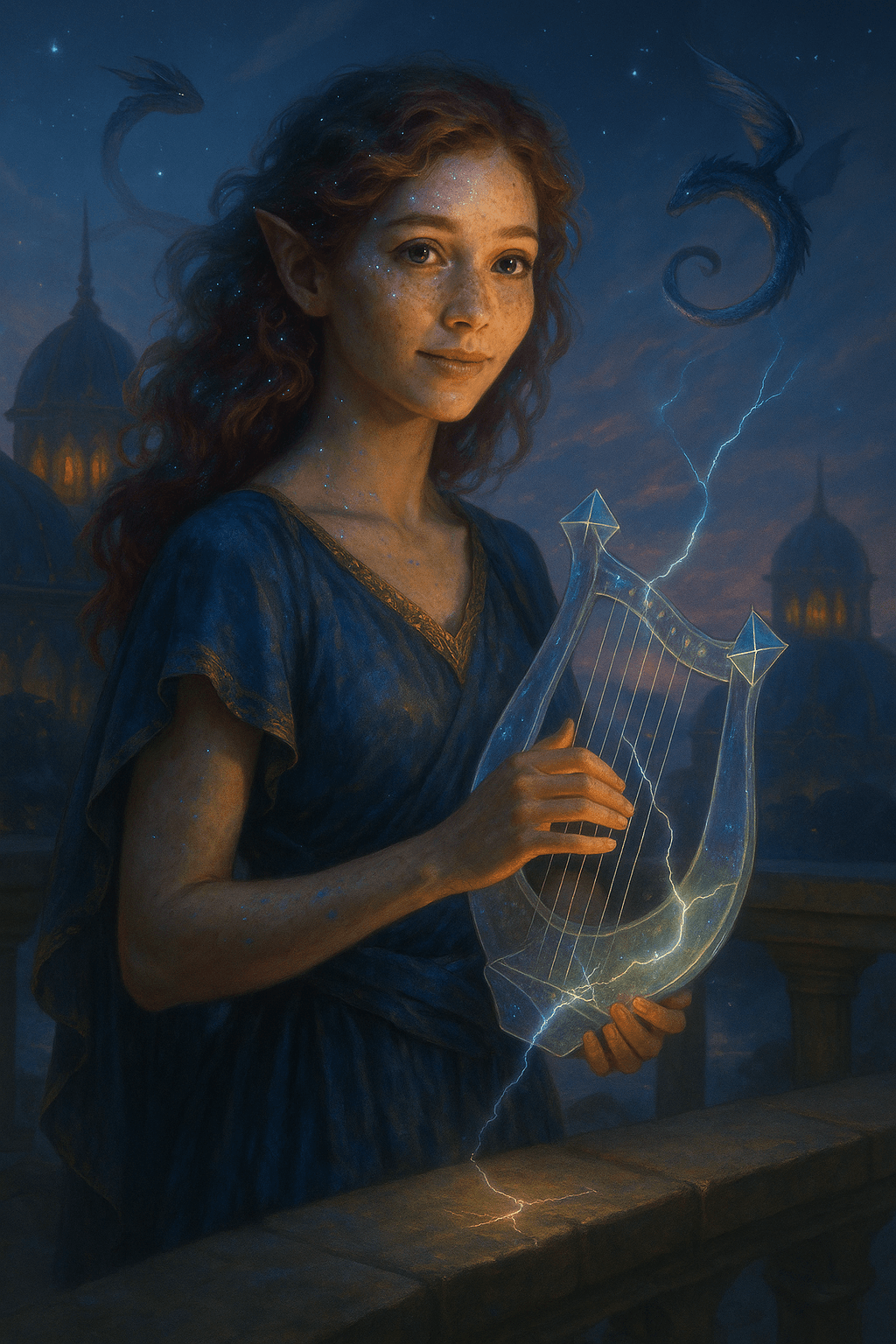Nalia Skyborn
Songs that stitch the sky.

Nalia Skyborn was born to the Spires the way dawn is born to glass: as light made useful. Among Skyreach’s Aether-born—those rare souls whose breath seems to keep time with starlight—she is the one who listens first. Where others measure fractures in crystals and draft proofs across driftwood tables, Nalia kneels beside a humming stone, hums back, and waits until the tone softens enough to speak.
Twilight.
By the time the Spires were reduced to a fragile ring of floating isles, the Order needed caretakers more than conquerors. Nalia earned her place not with spectacle but with repair. She learned to “tune” damaged ley-threads using voice, prism-glass, and a musician’s patience: a steady vowel to find the crack, a carefully split harmony to brace it, a final sustained note to call the whole line back into itself. Torren Vox, precise to a fault, once muttered that her method was “unorthodox but annoyingly correct,” which she took as high praise.
Her tools were simple: a palm harp of Aether-glass, a chain of tuning prisms, chalk for marking resonances on stone, and a diary crammed with tiny notations—arcs of pitch, sketches of broken sigils, and small drawings of the Glimmerdrakes that gathered whenever she practiced. She discovered that those playful drakes matched her tones instinctively; with them swirling like living metronomes, she led nightlong vigils that kept the lifts purring and the observatories steady.
When fear in the Spires curdled into factional quarrels, Nalia answered with ensembles rather than arguments. She would bring apprentices from rival studies to the same failing gantry and teach them to share the tone: one student holding the low note, another cycling a fifth above, Nalia walking the narrow bridge and singing the thread back into tune. By dawn, the gantry held—and so, a little more, did the Order. Quietly, steadily, she helped the Spires survive their dimmest hours.
Echoes.
The Return of the Prism Star changed the sky’s grammar. Predictions became possible again; old machines remembered their songs. Starseer Elyndor, newly burdened with leadership, sought voices he could trust to keep hope practical. Nalia was among the first he called. He tasked her with a delicate mandate: heal the damaged ley-lines that stitched the Aether Crown together—and train others to do it safely.
Nalia responded by turning maintenance into a shared craft. She designed “listening walks” across the isles: small groups moving at twilight with tuning prisms hung from belts, pausing wherever the wind “caught on nothing.” There she would teach them to match the catch with tone, draw slow arcs across the air with glass, and anchor the sound to the runic lattice beneath their feet. She always began the lesson the same way: “You do not force a fracture closed. You invite its edges to remember each other.”
Her friendship with Aetheria—brilliant, impatient, dangerously inventive—became a bridge across the Order’s new fault lines. Nalia did not try to blunt Aetheria’s ambition; she asked it to sing in harmony. Some nights they argued on the terraces, diagrams and melodies crossing like fireflies; more nights they collaborated, Nalia setting a stable tone while Aetheria tested small, brave adjustments to reality’s frayed weave. Torren Vox remained skeptical, but even he could not deny the statistics: fewer collapses, quieter alarms, steadier lifts.
Nalia’s influence spread beyond workshops. Festivals returned to the Aether Crown in modest form—lanterns along rope-light bridges, students performing repairs as public music—because she insisted that maintenance is culture, not drudgery. Pilgrims from other realms climbed the spiral stairs and found a city that still creaked but also breathed; in the plaza, Glimmerdrakes chased prismatic chords through mist while apprentices tuned the great wind-harps. For a people who once mistook brilliance for safety, Nalia taught a harder, humbler lesson: safety is a rhythm you keep together.
She keeps a ledger of failures, too, because music is honest. Some fractures refuse her call. Some nights the tone breaks and takes her voice with it for days. In those entries she writes only three words—“Begin again, softer”—and returns at dawn with tea for the team and a harp restrung to a gentler key. Hope, in her hands, is not a speech but a practice.
Ask anyone in the Spires what Nalia Skyborn does, and they’ll tell you it plainly: she makes broken things hold. Ask her, and she’ll answer more carefully: “I remind the islands how to listen to each other.” If the Spires find their way to a brighter age, it will be in no small part because she taught an entire city to sing its seams.
